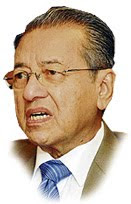Saturday March 28, 2009
World stuck with dollar
THE dollar is, and will remain, the US’ currency and its own and everyone else’s problem.
The idea of creating a global currency, as espoused by China earlier this week, is interesting, has a certain amount of merit and is simply not going to happen any time soon.
The US’ desire for free access to the cookie jar that being the world’s reserve currency represents will be too strong, especially given its need to finance huge amounts of debt reasonably cheaply. As well practicalities are fearsome, even if consensus was more or less there.
Chinese central bank head Zhou Xiaochuan on Monday called for the creation of a new “super-sovereign” global reserve currency, advocating building on an International Monetary Fund instrument called Special Drawing Rights.
Zhou echoed a call by Russia last week, when it indicated it would raise the issue at the upcoming Group of 20 meeting in London on April 2, saying the idea had support from emerging market economies including Brazil, India, South Korea and South Africa.
There is no doubt that the current system breeds instability, but it enjoys the great advantage of entrenchment and sticking with it allows the US, and others, to avoid making hard choices and paying true market prices for their economic decisions.
No surprise then that President Barack Obama knocked the idea down in blunt terms. “I don’t believe that there’s a need for a global currency,” Obama said, terming the dollar “extraordinarily strong right now.”
Exactly. Too strong by some margin, especially when one considers the coming effects of both quantitative easing and a massive long-term need to fund the costs of the debt binge that exploded and the ever increasing bailout to clean up the aftermath.
In fact, you could say the dollar’s “extraordinary” strength can only be fully explained when you take into account the fact that foreign central banks keep piling up huge reserves of the thing and that it is the international medium of exchange for commodities and energy, well really for global trade and financial intermediation.
Treasury Secretary Timothy Geithner said on Wednesday the US dollar is still the world’s reserve currency and will remain so for a long time, but expressed openness to greater use of IMF SDRs.
The dollar’s central role has two main implications, both rather ugly but also very seductive for those involved.
For the US, it’s a bit of a free ride as far as debt financing goes. People buy and hold treasuries more and the US gets cheaper financing that would otherwise be the case. Of course, that’s a bit like an alcoholic bartender getting a discount at work; a real benefit, but not a true one. It also means that even if the US has the will to take away the proverbial punchbowl or drive the dollar down, it doesn’t always have control, as what it does at the short end of the interest rate curve can be confounded by foreign purchases that keep the long end and financing costs down and the dollar up.
The US reserve status also opens up the opportunity for mercantilist countries, like, say China, to keep its own currency cheap, building up huge dollar stocks and force-feeding the American milch cow with cheap credit with which to buy imported goods.
That may not work any more anyway, as all of the cow’s stomachs are full and the milk’s gone thin.
There is a temptation also to build up reserves as protection against bad times and bitter IMF medicine. Many Asian leaders seem to have vowed after 1997 that they would do what was needed, which often included building up dollar reserves, to avoid having to meet an IMF director’s plane at the airport and accept the accompanying prescription.
That rather indicates that the old system, with the US as global reserve currency, is dying, but I doubt it will do so without a fight and with cooperation among nations willing to cede part of their sovereignty, even for a greater good.
It is amazing and encouraging that China speaks of ceding control of a portion of its foreign reserve assets to IMF management, but I have a hard time seeing it happening widely soon.
So, we will have to get through the next year or two without a super-sovereign currency and with global imbalances being worked out, or around, under the current system.
My best guess is that things actually go in the right direction, more or less. The dollar should weaken as a result of US policy even without a deliberate push downhill from the Chinese. Asian exporting nations will see slowing reserve growth generally, which should translate into diminished flows into the dollar and Treasuries.
That’s going to be painful all around. The Chinese and others will see their investments dwindle, even as they have to resist the impulse to sell into the fall. For the US the process of implementing monetary policy and paying for fiscal policy will be made that much more difficult.
So, goodbye and perhaps good riddance to dollar hegemony, but don’t expect a stable system of global cooperation to rise easily and quickly in its place. – Reuters
Saturday, March 28, 2009
Subscribe to:
Post Comments (Atom)







































No comments:
Post a Comment